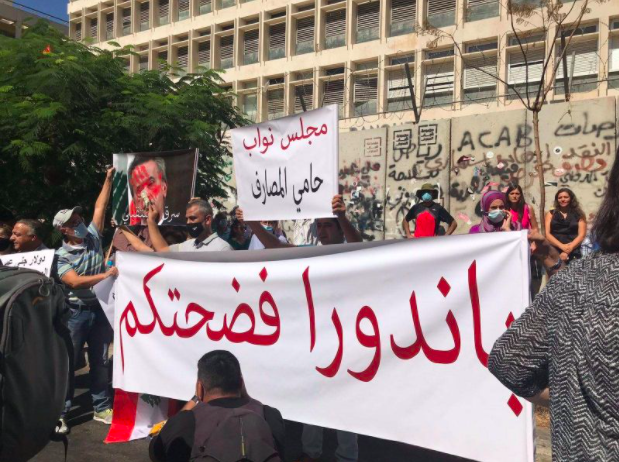
Protesters gather on Oct. 21, 2021, outside the central bank's Hamra headquarters in Beirut. (Credit: Richard Salame/L'Orient Today)
Want to get the Morning Brief by email? Click here to sign up.
Cabinet yesterday approved a modified draft version of a long-awaited capital control law. The law aims to legalize and standardize the ad-hoc banking restrictions that were illegally imposed on depositors after Lebanon’s financial crisis was triggered in 2019. Modifications to the draft included a change in the composition of the capital control committee, which is in charge of the law’s implementation. Prime Minister Najib Mikati and Economy Minister Amin Salam were replaced with two economic experts chosen by Mikati, in addition to a judge. Finance Minister Youssef Khalil will chair the committee while central bank Governor Riad Salameh, who was recently charged with illicit enrichment, also stays put. Deputy Premier Saade Chami said the committee will now serve for a maximum of two instead of three years. The draft capital control law will now be sent to Parliament, where it will likely be discussed at the committee level before being voted on. A joint parliamentary committee on Monday rejected the previous version of the capital control law for “defects” in form and content. The version increased the central bank’s power, granted a blank check to the banking industry on any local or international lawsuits related to money transfers and made the distinction between “fresh dollars” and pre-April 2020 foreign currency accounts.
Lebanon’s central bank yesterday extended Circular 161 once again even as the gap between the Sayrafa rate and the parallel market rate continues to widen. First issued on Dec. 16, Circular 161 was created following the dizzying deterioration of the lira, which at one point in January reached LL33,700 to the US dollar. The mechanism of releasing unlimited amounts of US dollars in the market through banks seemed to achieve its desired effect in the first two months of the year, when the gap between the Sayrafa rate and the parallel market rate narrowed to around 2 percent, down from an average of 15 percent in the preceding six months, with the exchange rate settling around LL20,500. However, financial statements published in mid-March by the central bank revealed the bank is running out of breathing room. Meanwhile, the much-maligned BDL governor did not show up to a government meeting to which he was summoned to explain matters related to financial and monetary policy. While no formal statements have been released, rumors abound about a search for Salameh’s potential successor to steer Banque du Liban. The lira is currently trading around LL24,400 to the US dollar on the parallel market against a Sayrafa rate of LL22,050 to the US dollar.
The Lebanese Foreign Ministry on Wednesday called the evacuation of Lebanese citizens who fled from the Russian invasion of Ukraine a “success.” However, this assessment contradicts several testimonies shared by Lebanese citizens who were stranded in Ukraine and were forced to evacuate to neighboring countries on their own. Several hundred Lebanese citizens who fled Ukraine were repatriated during the month of March, many of whom were stranded there or in neighboring countries for several days. Lebanese businessmen who hold Ukrainian nationality or are otherwise linked to the country are known to have paid for the repatriation of their fellow Lebanese citizens, as the government struggled to mobilize after the conflict erupted.
The Lebanese American University yesterday announced the dollarization of its tuition fees. The president of the university Michel Elias Mawad said that with the Lebanese currency’s constant devaluation, “the economy is moving to dollarization, so we have to collect our revenues in the same currency.” He acknowledged that the move does risk “having attrition on the number of students” but emphasized that the university has “obtained $100 million to help subsidize the tuition of students.” Mawad also said that LAU is working on opening a branch in Iraq and other countries “for the purpose of getting dollar revenues for the university to keep standing.” Although LAU’s student council vice president said the university administration assured the council that most students who are unable to afford the increased tuition will be granted financial aid, many LAU students reacted with shock to the announcement, with some saying the decision will force them to transfer to a more affordable university.
In case you missed it, here’s our must-read story from yesterday: “Abuses against the LGBTQ+ community explode in crisis-stricken Lebanon.”